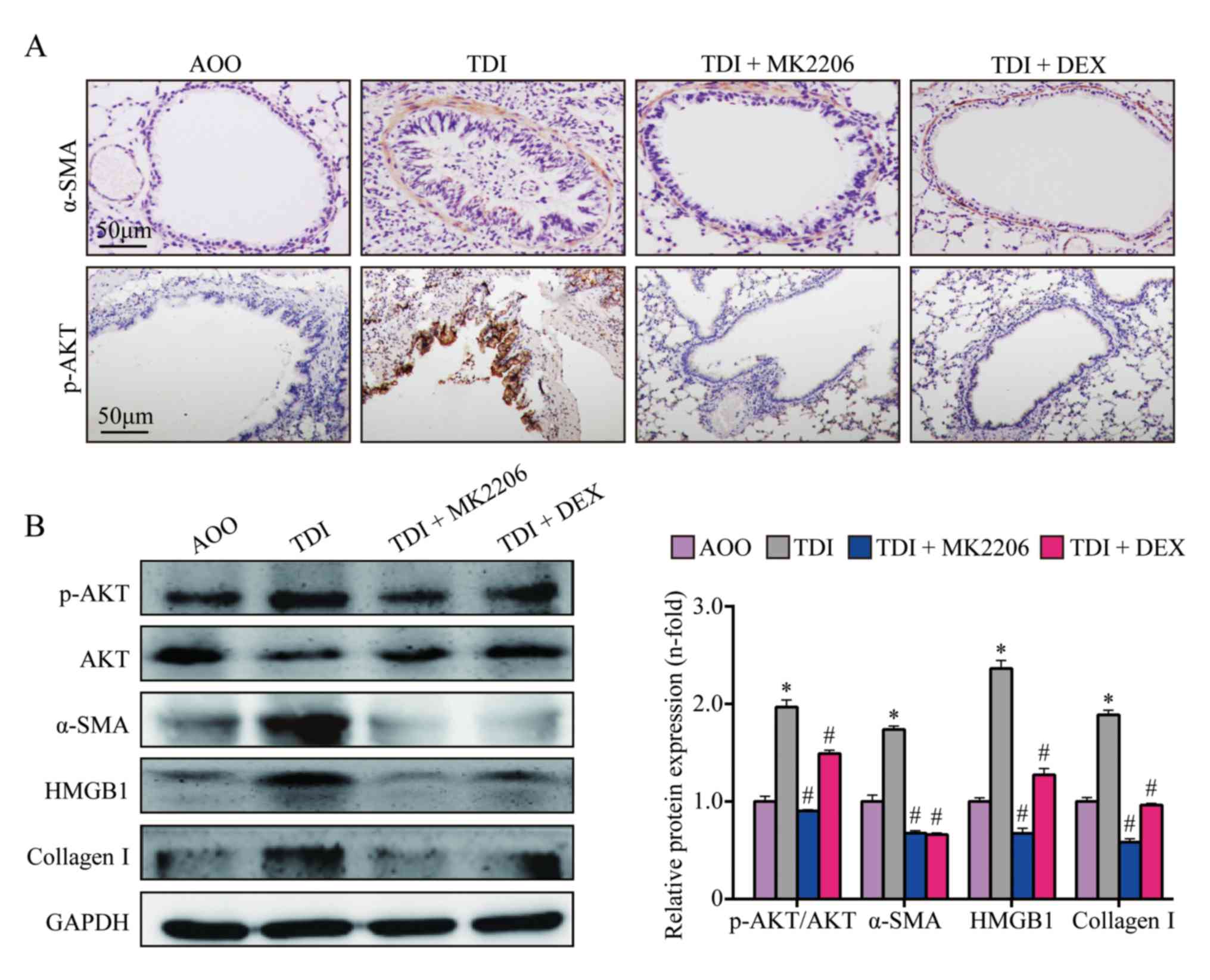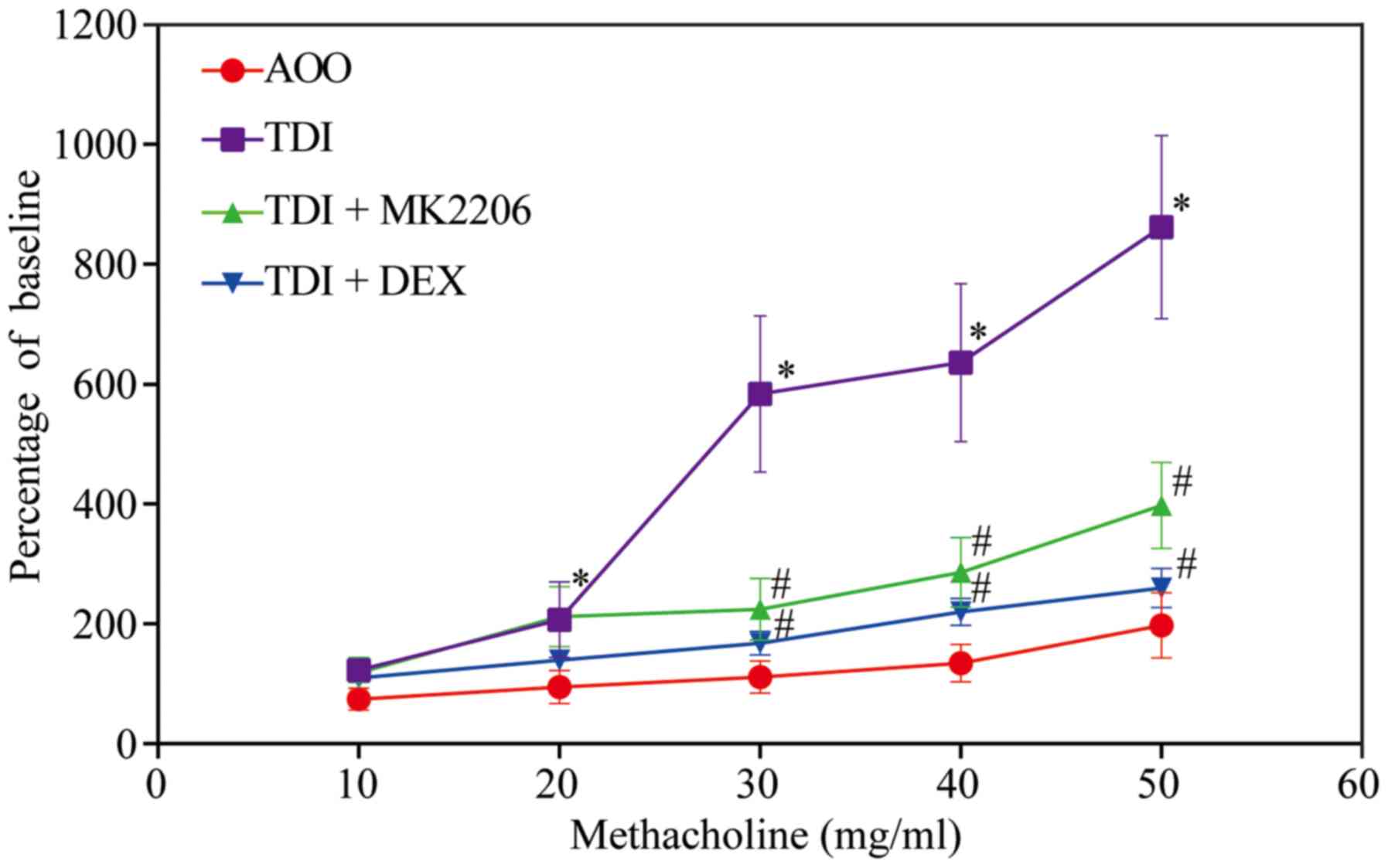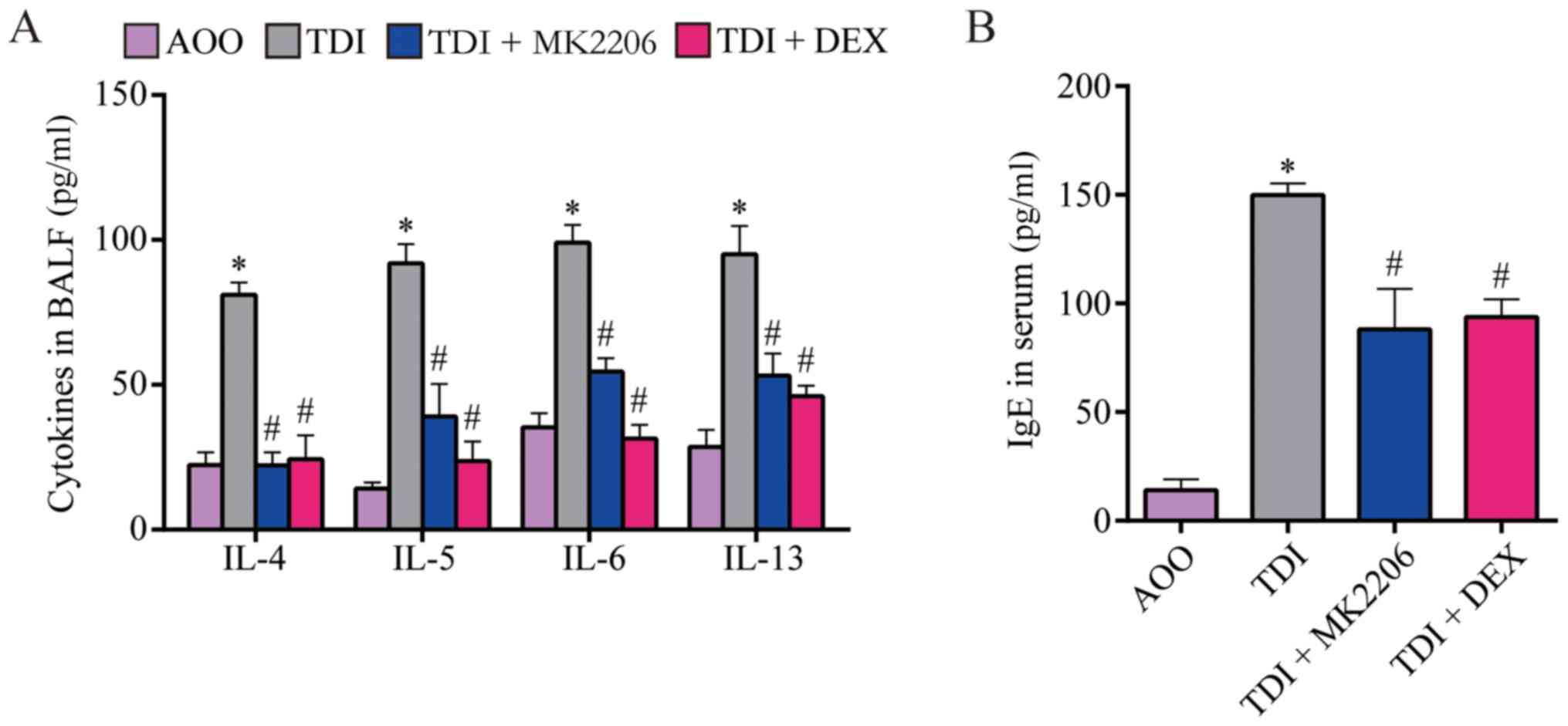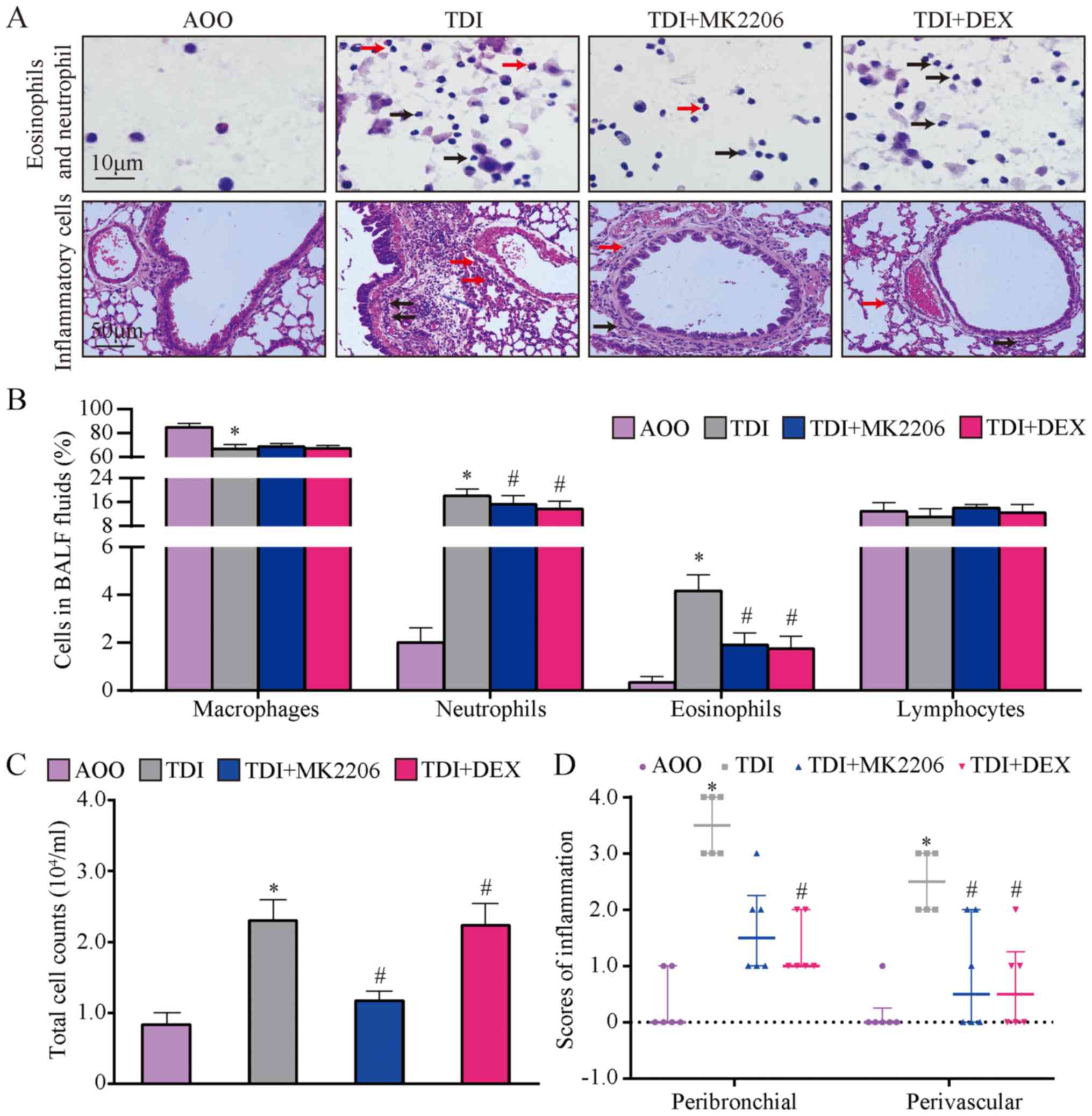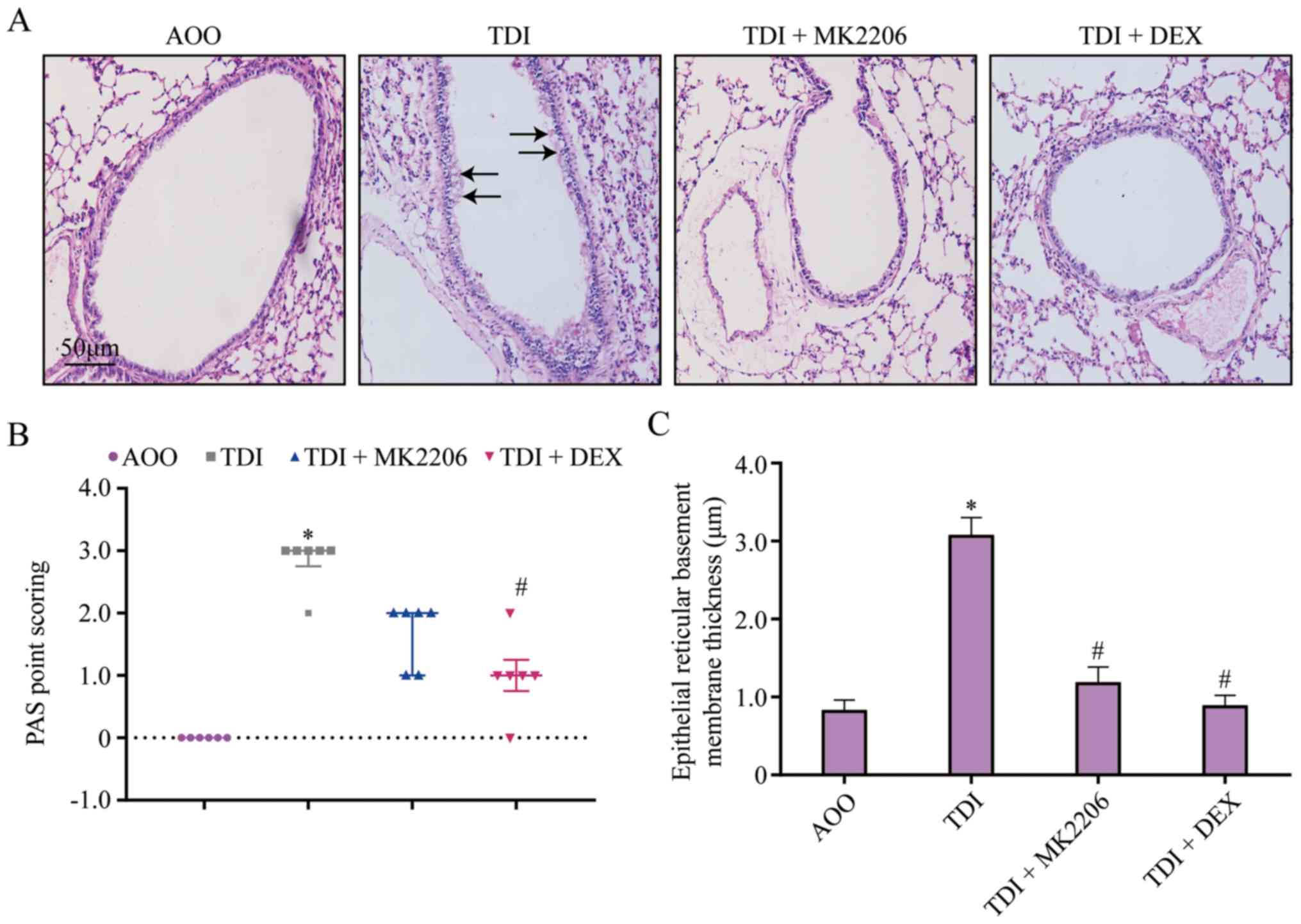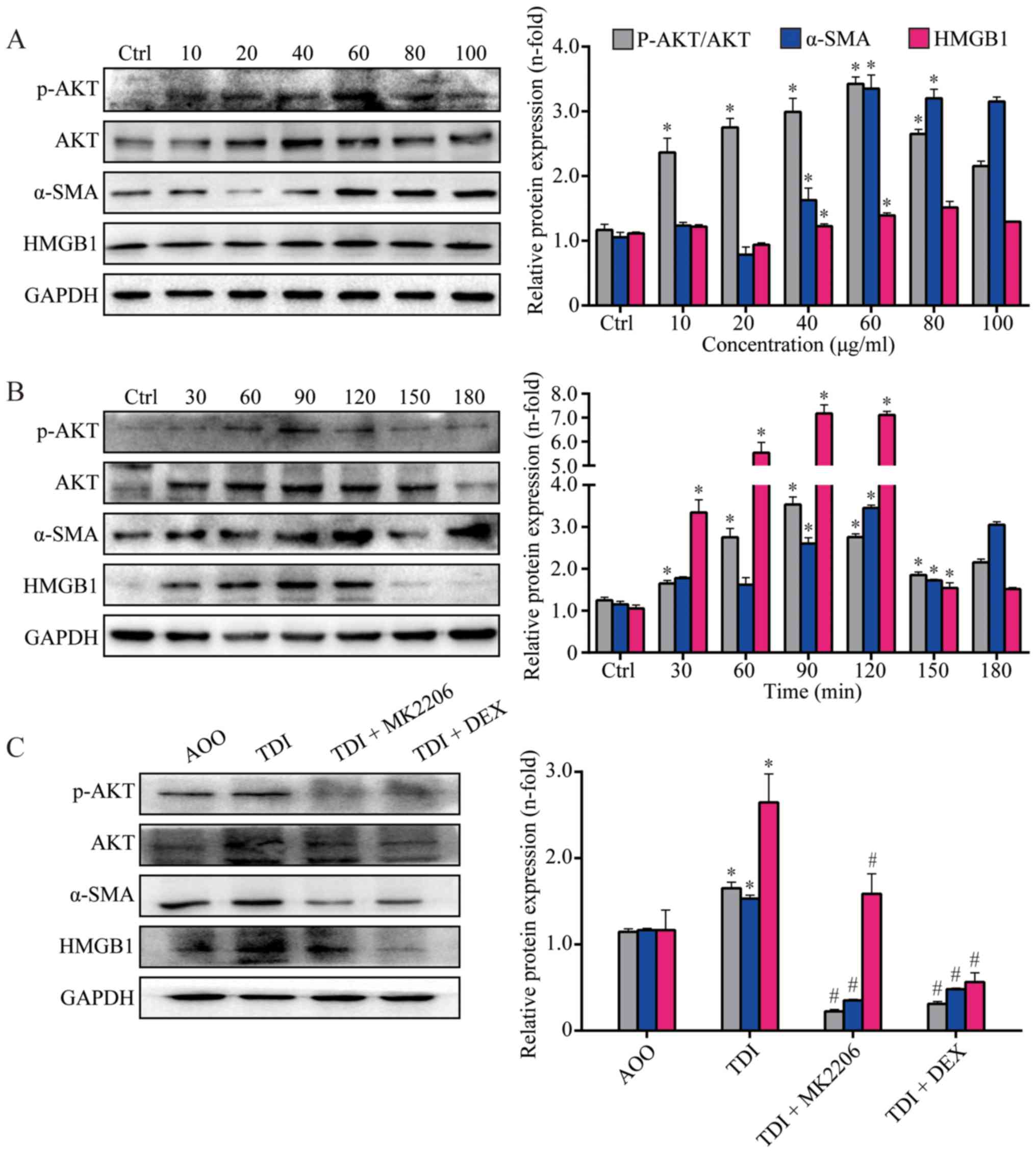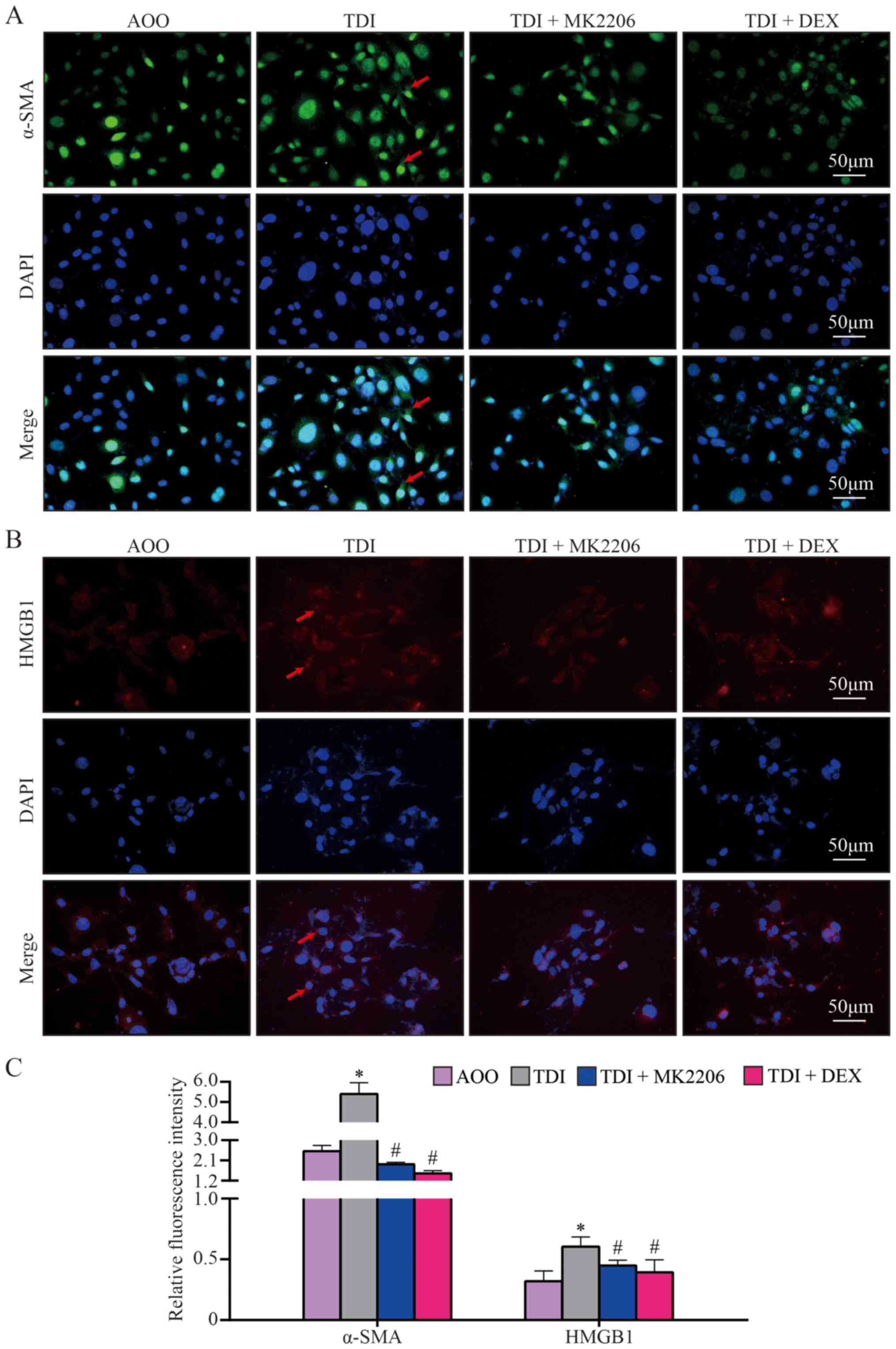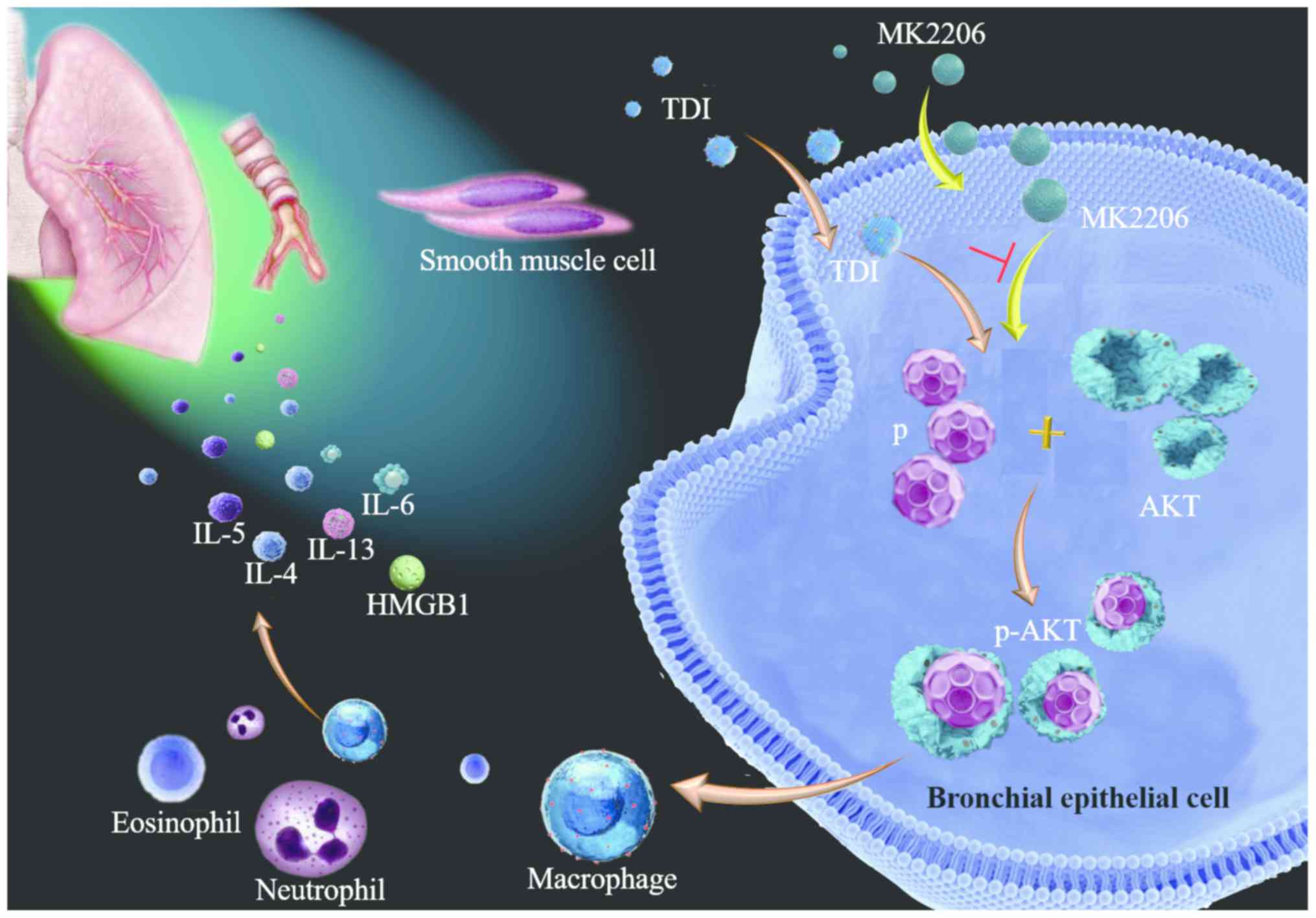|
1
|
Berend N, Salome CM and King GG:
Mechanisms of airway hyperresponsiveness in asthma. Respirology.
13:624–631. 2008. View Article : Google Scholar : PubMed/NCBI
|
|
2
|
Chapman KR, Albers FC, Chipps B, Muñoz X,
Devouassoux G, Bergna M, Galkin D, Azmi J, Mouneimne D, Price RG
and Liu MC: The clinical benefit of mepolizumab replacing
omalizumab in uncontrolled severe eosinophilic asthma. Allergy.
74:1716–1726. 2019. View Article : Google Scholar : PubMed/NCBI
|
|
3
|
Balmes J, Becklake M, Blanc P, Henneberger
P, Kreiss K, Mapp C, Milton D, Schwartz D, Toren K, Viegi G, et al:
American Thoracic Society Statement: Occupational contribution to
the burden of airway disease. Am J Respir Crit Care Med.
167:787–797. 2003. View Article : Google Scholar : PubMed/NCBI
|
|
4
|
Padoan M, Pozzato V, Simoni M, Zedda L,
Milan G, Bononi I, Piola C, Maestrelli P, Boschetto P and Mapp CE:
Long-term follow-up of toluene diisocyanate-induced asthma. Eur
Respir J. 21:637–640. 2003. View Article : Google Scholar : PubMed/NCBI
|
|
5
|
Maestrelli P, Boschetto P, Fabbri LM and
Mapp CE: Mechanisms of occupational asthma. J Allergy Clin Immunol.
123:531–544. 2009. View Article : Google Scholar : PubMed/NCBI
|
|
6
|
Collins JJ, Anteau S, Conner PR, Cassidy
LD, Doney B, Wang ML, Kurth L, Carson M, Molenaar D, Redlich CA and
Storey E: Incidence of occupational asthma and exposure to toluene
diisocyanate in the United States Toluene Diisocyanate Production
Industry. J Occup Environ Med. 59 (Suppl 12):S22–S27. 2017.
View Article : Google Scholar : PubMed/NCBI
|
|
7
|
Mapp CE, Balboni A, Baricordi R and Fabbri
LM: Human leukocyte antigen associations in occupational asthma
induced by isocyanates. Am J Respir Crit Care Med. 156
(Suppl):S139–S143. 1997. View Article : Google Scholar : PubMed/NCBI
|
|
8
|
Song J, Zhao H, Dong H, Zhang D, Zou M,
Tang H, Liu L, Liang Z, Lv Y, Zou F and Cai S: Mechanism of
E-cadherin redistribution in bronchial airway epithelial cells in a
TDI-induced asthma model. Toxicol Lett. 220:8–14. 2013. View Article : Google Scholar : PubMed/NCBI
|
|
9
|
Yao L, Zhao H, Tang H, Song J, Dong H, Zou
F and Cai S: Phosphatidylinositol 3-Kinase Mediates β-catenin
dysfunction of airway epithelium in a toluene diisocyanate-induced
murine asthma model. Toxicol Sci. 147:168–177. 2015. View Article : Google Scholar : PubMed/NCBI
|
|
10
|
Kwak YG, Song CH, Yi HK, Hwang PH, Kim JS,
Lee KS and Lee YC: Involvement of PTEN in airway
hyperresponsiveness and inflammation in bronchial asthma. J Clin
Invest. 111:1083–1092. 2003. View
Article : Google Scholar : PubMed/NCBI
|
|
11
|
Maltby S, Tay HL, Yang M and Foster PS:
Mouse models of severe asthma: Understanding the mechanisms of
steroid resistance, tissue remodelling and disease exacerbation.
Respirology. 22:874–885. 2017. View Article : Google Scholar : PubMed/NCBI
|
|
12
|
Hou C, Kong J, Liang Y, Huang H, Wen H,
Zheng X, Wu L and Chen Y: HMGB1 contributes to allergen-induced
airway remodeling in a murine model of chronic asthma by modulating
airway inflammation and activating lung fibroblasts. Cell Mol
Immunol. 12:409–423. 2015. View Article : Google Scholar : PubMed/NCBI
|
|
13
|
Musumeci D, Roviello GN and Montesarchio
D: An overview on HMGB1 inhibitors as potential therapeutic agents
in HMGB1-related pathologies. Pharmacol Ther. 141:347–357. 2014.
View Article : Google Scholar : PubMed/NCBI
|
|
14
|
Ullah MA, Loh Z, Gan WJ, Zhang V, Yang H,
Li JH, Yamamoto Y, Schmidt AM, Armour CL and Hughes JM: Receptor
for advanced glycation end products and its ligand high-mobility
group box-1 mediate allergic airway sensitization and airway
inflammation. J Allergy Clin Immunol. 134:440–450. 2014. View Article : Google Scholar : PubMed/NCBI
|
|
15
|
Yang Q, Liu X, Yao Z, Mao S, Wei Q and
Chang Y: Penehyclidine hydrochloride inhibits the release of
high-mobility group box 1 in lipopolysaccharide-activated RAW264.7
cells and cecal ligation and puncture-induced septic mice. J Surg
Res. 186:310–317. 2014. View Article : Google Scholar : PubMed/NCBI
|
|
16
|
Cockcroft DW and Davis BE: Mechanisms of
airway hyperresponsiveness. J Allergy Clin Immunol. 118:551–561.
2006. View Article : Google Scholar : PubMed/NCBI
|
|
17
|
Warner SM and Knight DA: Airway modeling
and remodeling in the pathogenesis of asthma. Curr Opin Allergy
Clin Immunol. 8:44–48. 2008. View Article : Google Scholar : PubMed/NCBI
|
|
18
|
Valatas V, Filidou E, Drygiannakis I and
Kolios G: Stromal and immune cells in gut fibrosis: The
myofibroblast and the scarface. Ann Gastroenterol. 30:393–404.
2017.PubMed/NCBI
|
|
19
|
Davies DE, Wicks J, Powell RM, Puddicombe
SM and Holgate ST: Airway remodeling in asthma: New insights. J
Allergy Clin Immunol. 111:215–226. 2003. View Article : Google Scholar : PubMed/NCBI
|
|
20
|
Cao L, Liu F, Liu Y, Liu T, Wu J, Zhao J,
Wang J, Li S, Xu J and Dong L: TSLP promotes asthmatic airway
remodeling via p38-STAT3 signaling pathway in human lung
fibroblast. Exp Lung Res. 44:288–301. 2018. View Article : Google Scholar : PubMed/NCBI
|
|
21
|
Somnay Y, Simon K, Harrison AD,
Kunnimalaiyaan S, Chen H and Kunnimalaiyaan M: Neuroendocrine
phenotype alteration and growth suppression through apoptosis by
MK-2206, an allosteric inhibitor of AKT, in carcinoid cell lines in
vitro. Anticancer Drugs. 24:66–72. 2013. View Article : Google Scholar : PubMed/NCBI
|
|
22
|
Yahiro Y, Maeda S, Shinohara N, Jokoji G,
Sakuma D, Setoguchi T, Ishidou Y, Nagano S, Komiya S and Taniguchi
N: PEG10 counteracts signaling pathways of TGF-β and BMP to
regulate growth, motility and invasion of SW1353 chondrosarcoma
cells. J Bone Miner Metab. 37:441–454. 2019. View Article : Google Scholar : PubMed/NCBI
|
|
23
|
Yang N, Zhang H, Cai X and Shang Y:
Epigallocatechin-3-gallate inhibits inflammation and
epithelial-mesenchymal transition through the PI3K/AKT pathway via
upregulation of PTEN in asthma. Int J Med. 41:818–828. 2018.
|
|
24
|
Liang J, Zhao H, Yao L, Tang H, Dong H, Wu
Y, Liu L, Zou F and Cai S: Phosphatidylinositol 3-kinases pathway
mediates lung caspase-1 activation and high mobility group box 1
production in a toluene-diisocyanate induced murine asthma model.
Toxicol Lett. 236:25–33. 2015. View Article : Google Scholar : PubMed/NCBI
|
|
25
|
Lezmi G, Gosset P, Deschildre A, Abou-Taam
R, Mahut B, Beydon N and de Blic J: Airway remodeling in preschool
children with severe recurrent wheeze. Am J Respir Crit Care Med.
192:164–171. 2015. View Article : Google Scholar : PubMed/NCBI
|
|
26
|
Wen X, Yan J, Han XR, Zheng GH, Tang R,
Liu LF, Wu DM, Lu J and Zheng YL: PTEN gene silencing contributes
to airway remodeling and induces airway smooth muscle cell
proliferation in mice with allergic asthma. J Thoracic Dis.
10:202–211. 2018. View Article : Google Scholar
|
|
27
|
Xiong J, Zhao W, Lin Y, Yao L, Huang G, Yu
C, Dong H, Xiao G, Zhao H and Cai S: Phosphorylation of low density
lipoprotein receptor-related protein 6 is involved in receptor for
advanced glycation end product-mediated β-catenin stabilization in
a toluene diisocyanate-induced asthma model. Int Immunopharmacol.
59:187–196. 2018. View Article : Google Scholar : PubMed/NCBI
|
|
28
|
Yao L, Zhao H, Tang H, Liang J, Liu L,
Dong H, Zou F and Cai S: The receptor for advanced glycation end
products is required for beta-catenin stabilization in a
chemical-induced asthma model. Br J Pharmacol. 173:2600–2613. 2016.
View Article : Google Scholar : PubMed/NCBI
|
|
29
|
Lundblad LK, Irvin CG, Adler A and Bates
JH: A reevaluation of the validity of unrestrained plethysmography
in mice. J Appl Physiol. 93:1198–1207. 2002. View Article : Google Scholar : PubMed/NCBI
|
|
30
|
Ye Z, Huang Y, Liu D, Chen X, Wang D,
Huang D, Zhao L and Xiao X: Obesity induced by neonatal overfeeding
worsens airway hyperresponsiveness and inflammation. PLoS One.
7:e470132012. View Article : Google Scholar : PubMed/NCBI
|
|
31
|
Tang H, Zhao H, Song J, Dong H, Yao L,
Liang Z, LV Y, Zou F and Cai S: Ethyl pyruvate decreases airway
neutrophil infiltration partly through a high mobility group box
1-dependent mechanism in a chemical-induced murine asthma model.
Int Immunopharmacol. 21:163–170. 2014. View Article : Google Scholar : PubMed/NCBI
|
|
32
|
Padrid P, Snook S, Finucane T, Shiue P,
Cozzi P, Solway J and Leff AR: Persistent airway
hyperresponsiveness and histologic alterations after chronic
antigen challenge in cats. Am J Respir Crit Care Med. 151:184–193.
1995. View Article : Google Scholar : PubMed/NCBI
|
|
33
|
Chung KF, Wenzel SE, Brozek JL, Bush A,
Castro M, Sterk PJ, Adcock IM, Bateman ED, Bel EH, Bleecker ER, et
al: International ERS/ATS guidelines on definition, evaluation and
treatment of severe asthma. Eur Respir J. 43:343–373. 2014.
View Article : Google Scholar : PubMed/NCBI
|
|
34
|
Soriano JB, Abajobir AA, Abate KH, Abera
SF, Agrawal A, Ahmed MB, Aichour AN, Aichour I, Aichour MTE, Alam
K, et al: Global, regional, and national deaths, prevalence,
disability-adjusted life years, and years lived with disability for
chronic obstructive pulmonary disease and asthma, 1990–2015: A
systematic analysis for the Global Burden of Disease Study 2015.
Lancet Respir Med. 5:691–706. 2017. View Article : Google Scholar : PubMed/NCBI
|
|
35
|
Al Efraij K and FitzGerald JM: Current and
emerging treatments for severe asthma. J Thorac Dis. 7:E522–E525.
2015.PubMed/NCBI
|
|
36
|
Hutchinson JN, Jin J, Cardiff RD, Woodgett
JR and Muller WJ: Activation of Akt-1 (PKB-alpha) can accelerate
ErbB-2-mediated mammary tumorigenesis but suppresses tumor
invasion. Cancer Res. 64:3171–3178. 2004. View Article : Google Scholar : PubMed/NCBI
|
|
37
|
Chin YR and Toker A: Akt isoform-specific
signaling in breast cancer: Uncovering an anti-migratory role for
palladin. Cell Adh Migr. 5:211–214. 2011. View Article : Google Scholar : PubMed/NCBI
|
|
38
|
Lara PN Jr, Longmate J, Mack PC, Kelly K,
Socinski MA, Salgia R, Gitlitz B, Li T, Koczywas M, Reckamp KL and
Gandara DR: Phase II study of the AKT Inhibitor MK-2206 plus
Erlotinib in patients with advanced non-small cell lung cancer who
previously progressed on erlotinib. Clin Cancer Res. 21:4321–4326.
2015. View Article : Google Scholar : PubMed/NCBI
|
|
39
|
Brooks SM, Werk EE, Ackerman SJ, Sullivan
I and Thrasher K: Adverse effects of phenobarbital on
corticosteroid metabolism in patients with bronchial asthma. N Engl
J Med. 286:1125–1128. 1972. View Article : Google Scholar : PubMed/NCBI
|
|
40
|
Mylka V, Deckers J, Ratman D, De Cauwer L,
Thommis J, De Rycke R, Impens F, Libert C, Tavernier J, Vanden
Berghe W, et al: The autophagy receptor SQSTM1/p62 mediates
anti-inflammatory actions of the selective NR3C1/glucocorticoid
receptor modulator compound A (CpdA) in macrophages. Autophagy.
14:2049–2064. 2018. View Article : Google Scholar : PubMed/NCBI
|
|
41
|
Takeda M, Ito W, Tanabe M, Ueki S, Kihara
J, Kato H, Tanigai T, Kayaba H, Sasaki T and Chihara J: The
pathophysiological roles of PI3Ks and therapeutic potential of
selective inhibitors in allergic inflammation. Int Arch Allergy
Immunol. 152 (Suppl 1):S90–S95. 2010. View Article : Google Scholar
|
|
42
|
Kampe M, Lampinen M, Stolt I, Janson C,
Stalenheim G and Carlson M: PI3-kinase regulates eosinophil and
neutrophil degranulation in patients with allergic rhinitis and
allergic asthma irrespective of allergen challenge model.
Inflammation. 35:230–239. 2012. View Article : Google Scholar : PubMed/NCBI
|
|
43
|
Chung MJ, Sohng JK, Choi DJ and Park YI:
Inhibitory effect of phloretin and biochanin A on IgE-mediated
allergic responses in rat basophilic leukemia RBL-2H3 cells. Life
Sci. 93:401–408. 2013. View Article : Google Scholar : PubMed/NCBI
|
|
44
|
Tang L, Chen Q, Meng Z, Sun L, Zhu L, Liu
J, Hu J, Ni Z and Wang X: Suppression of Sirtuin-1 increases IL-6
expression by activation of the akt pathway during allergic asthma.
Cell Physiol Biochem. 43:1950–1960. 2017. View Article : Google Scholar : PubMed/NCBI
|
|
45
|
Le Cras TD, Acciani TH, Mushaben EM,
Kramer EL, Pastura PA, Hardie WD, Korfhagen TR, Sivaprasad U,
Ericksen M, Gibson AM, et al: Epithelial EGF receptor signaling
mediates airway hyperreactivity and remodeling in a mouse model of
chronic asthma. Am J Physiol Lung Cell Mol Physiol. 300:L414–L421.
2011. View Article : Google Scholar : PubMed/NCBI
|
|
46
|
Postma DS and Timens W: Remodeling in
asthma and chronic obstructive pulmonary disease. Proc Am Thoracic
Soc. 3:434–439. 2006. View Article : Google Scholar
|
|
47
|
Halwani R, Al-Muhsen S and Hamid Q: Airway
remodeling in asthma. Curr Opin Pharmacol. 10:236–245. 2010.
View Article : Google Scholar : PubMed/NCBI
|
|
48
|
Wang N, Yan D, Liu Y, Liu Y, Gu X, Sun J,
Long F and Jiang S: A HuR/TGF-β1 feedback circuit regulates airway
remodeling in airway smooth muscle cells. Respir Res. 17:1172016.
View Article : Google Scholar : PubMed/NCBI
|
|
49
|
Hou C, Zhao H, Liu L, Li W, Zhou X, Lv Y,
Shen X, Liang Z, Cai S and Zou F: High mobility group protein B1
(HMGB1) in Asthma: Comparison of patients with chronic obstructive
pulmonary disease and healthy controls. Mol Med. 17:807–815. 2011.
View Article : Google Scholar : PubMed/NCBI
|
|
50
|
Winder A, Unno K, Yu Y, Lurain J and Kim
JJ: The allosteric AKT inhibitor, MK2206, decreases tumor growth
and invasion in patient derived xenografts of endometrial cancer.
Cancer Biol Ther. 18:958–964. 2017. View Article : Google Scholar : PubMed/NCBI
|















